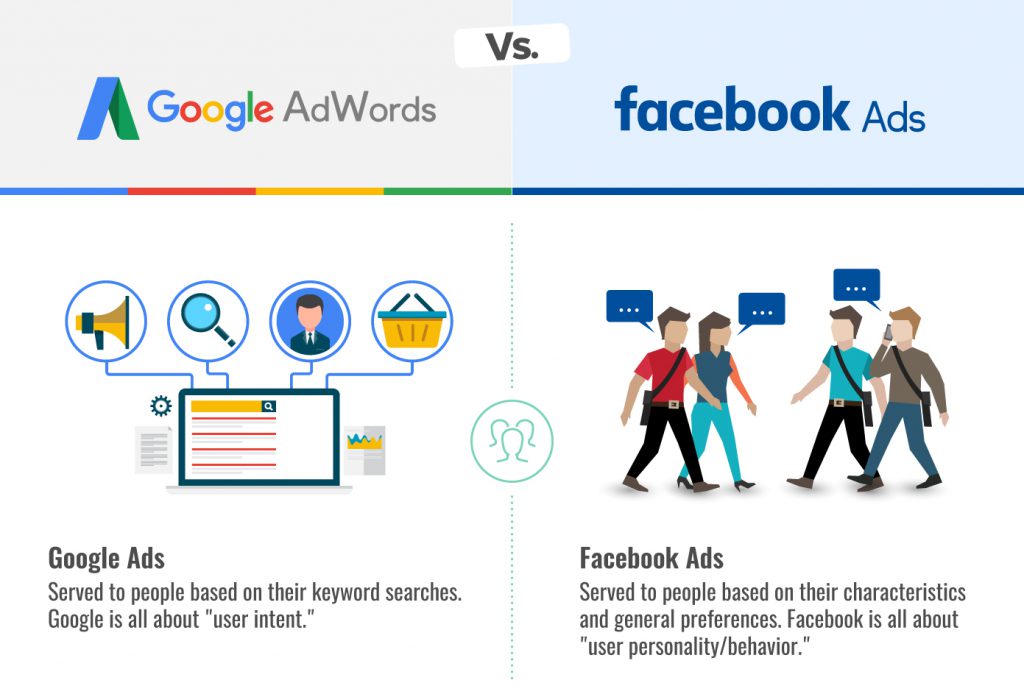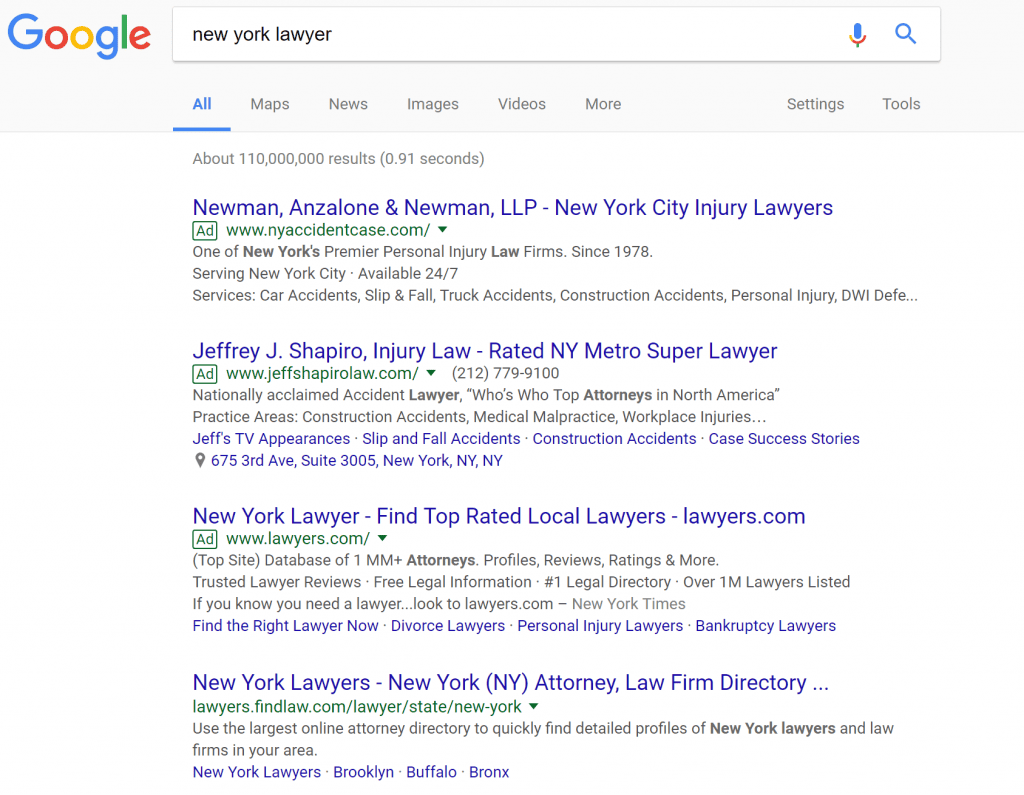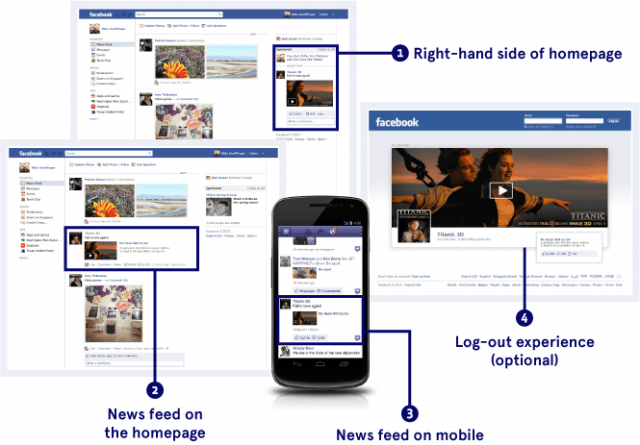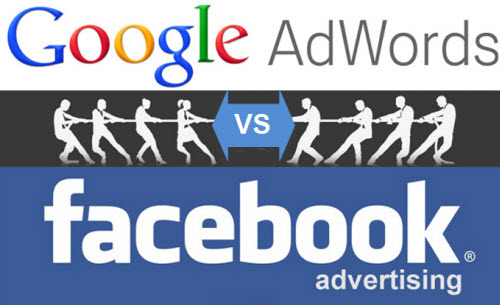While there are many ways to advertise online we’re going to focus on the Big Two and the differences and similarities between them. And when we talk about the Big Two, we’re talking about Facebook and Google Adwords.
Facebook and Google both offer Pay Per Click models, which means you are charged only when someone clicks your ads. But they are very different in how they go about getting those clicks. Here’s how:
Keywords vs. Demographics
Google: Relies on keywords to trigger relevant ads. As a business advertiser, you bid on certain keywords that someone might enter into a Google search that would trigger your ad in the hopes that they will click the ad, go to your website, landing page or offer, and take a desired action (purchase, call, book, download, follow, etc).
Facebook: Advertising on Facebook is NOT keyword-based. It is demographic-based. When setting up a Facebook ad campaign, you can target:
- Age
- Gender
- Hobbies and interests
- Income levels
This allows you to target and sell motorcycle helmets to motorcycle enthusiasts. People who are into gardening will not see your ads UNLESS they are into motorcycle riding AND gardening..
[bctt tweet=”Advertising on Facebook is NOT keyword-based. It is demographic-based.” username=”samsonmedia”]
Keyword vs. Demographic Summary: Keep in mind that Google users are probably warmer leads because they are actively searching for answers. Facebook ads, while very targeted to specific interests, are more akin to TV and Radio ads in that, while they may reach a larger swath of people, it’s more a form of interruption marketing, a phrase coined by marketing expert Seth Godin. As a result, Google Adword PPC costs are generally much higher than Facebook PPC costs.

Formats:
Google: The bread and butter of Google Adwords is text ads. They also offer display ads of various sizes for display on other sites that publish Google Adwords and share in the PPC revenue. Google’s secret weapon: YouTube!

Facebook: Much more robust in terms of format choices. Facebook offers image carousels, videos, graphics and their secret weapon: Instagram; now owned by Facebook!

Geographic Targeting
Google: Offers a very sophisticated way to pin-point target specific geographical locations. You can do it by zip code, county, city, state, etc. You can also stick your pin on the map and select a mile radius around a specific location. You can also opt out very specific locations. For instance, want to advertise to New York city except Staten Island? No problem.
Facebook: Also allows geographical targeting but not as pin-point as Google but pretty good for the majority of advertisers. Want to reach motorcycle riders in Minneapolis who are women and ALSO like gardening? No problem.
Targeting Summary: Keep in mind that Google serves your ads to people actively searching for things while Facebook serves your ads to people who match your demographic criteria having NOTHING TO DO WITH SEARCH. This is an important distinction!
Budgeting
Google: Let’s say your budget is $1,000 for the month. You can tell Google to spread it out so the $1,000 lasts a month. That means the ads may be turned on or paused depending on how much activity there is. Remember — it’s Pay Per Click, so every click costs you a certain amount. It may be $5 a click or $15 a click. When setting up your campaign, Google will tell you the estimated budget amounts based on the supply and demand of your keywords at that given time. Want to come up for a phrase that’s highly competitive? You’ll pay more per click. But Google will regulate your ads and adjust their amount of exposure to capture as many clicks as your budget will allow. One side effect is that sometimes the amount of people looking for a particular search phrase in a particular geographic area is not enough to spend your budget. This may be because there just isn’t the population density required to generate enough searches that result in enough clicks. So Google will serve it more to try and capture more clicks (they want to spend your money) but sometimes they just can’t for the reasons I’ve explained.
Please note: While you set your budget at $1,000, it still may go over by 1-2%.
Facebook: Same as Google. You tell Facebook to make your $1,000 last a specific length of time. This can be shorter (for an upcoming sale or event where you need the whole budget spent in 5 days) or longer if you want it to last two weeks or two months. Worth noting: Facebook costs per click are much lower, often under $1.
Budgeting Summary: Keep in mind the price of what you are selling. Especially with Google. I would not recommend Google Adwords for selling inexpensive items, like $30, $40, $50 or even $100. The reason? If your keywords are costing $5 a click (which is a conservative estimate), how many clicks will it take to convert to a sale? You’ll know in several days what your conversion rate will be, so if it takes 10 clicks to make one sale, for example, if each click costs you $2 let’s say, that would be $20. One sale out of 10 clicks (which is actually pretty good) means a 10% conversion rate. So it cost you $20 to make one sale. If your item is inexpensive that might not be worth it. But if it costs you $500 in click-throughs to sell a $5,000 service, that would probably be worth it.
The point is to measure your ROI on your cost per click and your click through rate as it relates to your conversion to a sale. Spend $500 to make $5,000? You would do that all day long. Spend $20 to make $40? Maybe not. And in some cases, if you’re not careful, it will cost you more in PPC charges than the sale price of the product. Cost per click (CPC), Click-thru rate (CTR) and conversions are all tracked in the dashboards of both platforms.
Some companies, of course, aren’t selling any specific products at all but are trying to buy relevant search traffic in the hopes of converting the person into a lead, warm prospect or in the hopes of getting them to opt-into an email sequence to help build a mailing list so that person can be sold to down the road. This makes perfect sense for more complicated services, high end products and services that require additional touch points. Bottom line: know your objectives before spending any money.
[bctt tweet=” I would not recommend Google Adwords for selling inexpensive items, like $30, $40, $50 or even $100. ” username=”samsonmedia”]
Remarketing and Tracking Pixels
Google: You can put a tracking pixel on your website, to track a conversion as we discussed in budgeting. And you can also use a tracking pixel for remarketing. By putting a remarketing tracking pixel on your site, when someone visits your website, they get tagged as they travel around the Internet and they will start seeing your ads in various places that show Google ads. Google will actually build a remarketing list of those visitors to your site inside your Adwords account. Although anonymous to you, you can set a portion of your ad budget aside and assign it to this remarketing campaign. This basically means that you can choose (pay) to show your ads to people most likely interested in your products and services because they visited your website. That’s striking while the iron is hot. The tracking pixel works for about 30 days before expiring.
Facebook: Similar to Google. It’s especially powerful when someone visits your website and leaves and then goes to their own Facebook page the next day and sees your ad. So you can see how effective that can be to show visitors to your website your ad when they visit their own Facebook page.
Remarketing and Tracking Pixel Summary: By using remarketing and tracking pixels you are basically extending the reach of your ads beyond Facebook and beyond the search results on Google.com. They can also be used to confirm sales by putting them on the Thank You page after a purchase (for ecommerce sites). This will allow you to know precisely how much it cost you to make that sale. Tracking pixels are a powerful way to keep reaching warn leads and confirming sales when they make a purchase or take a desired action.
[bctt tweet=” If you wind up spending more on sales then the product or service is worth —- you can’t make it up in volume!” username=”samsonmedia”]
SUMMARY: My take is Google Adwords can get expensive very quickly. Google provides many tools within Adwords that will estimate in advance what you will probably pay per click. But only you will know how many clicks it will take to make a sale. Often you will not really know the answer until you release the live campaign into the wild. But the beauty of all PPC platforms, Google, Facebook and even Bing and others, is that you will know exactly what your sales and leads are costing you. You can easily do split tests to see what works best and tightly control your budgets along the way. But you need to be vigilant to make sure your campaigns make sense. If you wind up spending more on sales then the product or service is worth —- you can’t make it up in volume!
RELATED RESOURCES
Why You Should Stop Boosting Posts on Facebook


